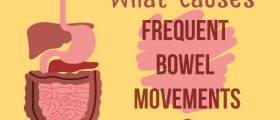
Introduction to irregular bowel movements
The biggest problem with irregular bowel movements is that they can be very embarrassing for a person and the fact that a person cannot control these movements the way they would like to can cause a lot of anxiety and stress for the individual.
It is believes that a person who have more than three loose stools a day or less than four stool total per week is said to have irregular bowel movements.
So, both people who have problems with constipation and diarrhea can be said to be suffering from irregular bowel movements.
When a person gets older, the regularity of their bowel movements will probably reduce, with one per day being the most common pattern.
Causes of irregular bowel movements
The primary causes of irregular bowel movements are not drinking enough water, hormonal changes, poor dietary practices and habits, a lack of exercise, stress and anxiety, side effects from medicines and antibiotics, and hypothyroidism and diabetes.
When a newborn is having this problem it is usually called by cystic fibrosis. Iron supplements and sedatives can also cause irregular bowel movements.
Spice foods can also be a culprit, especially for people who do not eat enough fiber.
If a person is suffering from a chronic bout of constipation, it is best to visit the doctor immediately.
Symptoms of irregular bowel movements
Common symptoms of the condition include, bloating and cramping, problems passing stools after surgery, painful or bloody bowel movements, burning sensations when trying to pass a stool, and bowel movements immediately following a meal.
Irregular bowel movements - Home remedies
Before going out an buying products from the pharmacy, it is important to remember that there are many natural and much safer remedies that can be used to help with irregular bowel movements.
Peppermint oil, for example, can be mixed with warm water and taken as a solution for such problems. Ginger is also an excellent remedy. It can be eaten raw or served as a tea. However, it is important to note that people with heart disease or diabetes should avoid ginger.
Aloe Vera juice can be consumed in order to relieve pain in the stomach and constipation.
A paste can be made with green cardamom, pepper and dry ginger. The paste should be taken with a glass of water every morning.
It is also a very good idea to completely remove coffee and alcohol from the diet, because these beverages can upset the stomach.
Chamomile tea is another excellent treatment that provides relief for people suffering from irregular bowel movements.

















Your thoughts on this
Loading...